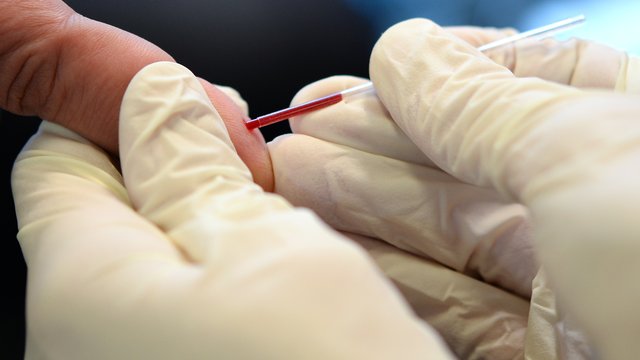Pledge to tackle HIV in Manchester
28 August 2018, 06:38 | Updated: 28 August 2018, 06:40

Greater Manchester is to join a global network of cities spearheading the fight against HIV.
Mayor of Greater Manchester Andy Burnham unveiled the plan for the city-region to become part of the Fast Track Cities network as he spoke at the Manchester Pride Candlelit Vigil, where thousands of people came together in Sackville Gardens to remember those lost to HIV and stand united against the challenges facing LGBT communities.
In launching the application, the Mayor set out the bold plan to end all new cases of HIV in Greater Manchester residents within 25 years.
Greater Manchester Health and Social Care Partnership, responsible for health and care devolution, is working with a broad network of communities and partners, to achieve this through a £1.3 million programme of targeted support for people living with HIV or most at risk.
Actions being introduced from later this year include:
Encouraging the use of PrEP and PEP medication amongst the most at-risk groups, which has been proven to stop HIV in its tracks
Establishing new peer-led services and support tailored to individual needs
Substantially increasing screening and testing at home, in the community and through sexual health services
Maximising prompt and effective treatment for those diagnosed; and
Challenging stigmas and other social and cultural barriers that prevent people accessing testing and support.
Further promoting and encouraging safer sex practices.
As a Fast Track City, Greater Manchester would join more than 250 others from across the globe to take combined action, share best practice and tackle discrimination. These cities typically have significant numbers of people living with HIV.
Across Greater Manchester, more than 5,650 people are thought to be living with HIV. The rate per thousand of the population is higher than the England average – in Manchester almost three times higher and in Salford almost double.
Almost 300 new HIV diagnoses are made every year in Greater Manchester. 44% of these come at a late stage, greatly increasing impacts to individuals’ lives, risks of onward transmission and costs of treatment. In addition, around 745 people are thought to be living with HIV but unaware of their positive status.
Mayor of Greater Manchester Andy Burnham said: “Ending all new cases of HIV in Greater Manchester within a generation is an ambitious goal – but we can do it. We are doing ground-breaking work in Greater Manchester to tackle HIV, and by joining Fast Track Cities we will be part of a global network of cities committed to ending HIV where we can share expertise and speak with a united worldwide voice.
“It also shows that we are taking a stand against stigma, instead standing shoulder to shoulder with people living with HIV.”
Lord Peter Smith, Chair of the Greater Manchester Health and Social Care Partnership said: “Although great progress has been made in the fight against HIV, there is still much to do – both around the world and across our city-region. Becoming a Fast Track City would be a great endorsement of our £1 million ambition to eliminate new cases of HIV in Greater Manchester within a generation, and an important step towards realising this vision”.
Eleanor Roaf, Trafford Council Interim Director of Public Health, Co-Chair of the Greater Manchester Sexual Health Network, said: “We are delighted to be joining the group of Fast Track Cities. Greater Manchester has a great track record in developing and delivering excellent sexual health services but there is still more to do. We still see too many people becoming infected with HIV, or not being diagnosed as early as they could be. Our existing investments, coupled with the extra funding and the Fast Track City status, gives us a real opportunity to address this.”
LGBT Foundation Deputy Chief Executive Rob Cookson, from the PaSH Partnership, said: “‘The desire to join Fast Track Cities is amazing news and supports Greater Manchester’s ambition to end all new transmissions of HIV within a generation. HIV is such an important issue for so many people. This now gives Greater Manchester the opportunity to create zero HIV infections and zero stigma’.






